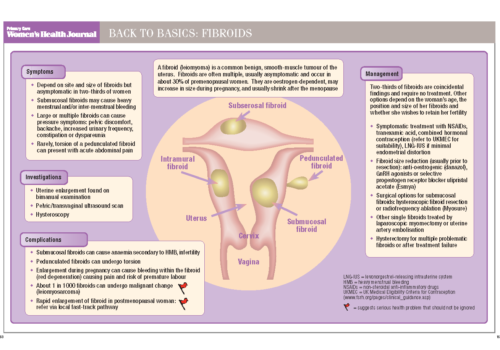


This resource is fully searchable using the search box at the top of the page, or to narrow down your selection using filters click on 'Knowledge hub' in the main navigation.


This resource provides access to informative articles on the broad spectrum of obstetric and gynaecological issues managed in primary care including sexual and reproductive health.
These materials cover some of the most important topics in daily care including:
![]() Contraception across different age groups
Contraception across different age groups
![]() Early detection of gynaecological cancers
Early detection of gynaecological cancers
![]() Pre-menstrual syndromes
Pre-menstrual syndromes
![]() Use of testosterone
Use of testosterone
![]() Menstruation and abnormal uterine bleeding
Menstruation and abnormal uterine bleeding
![]() Fertility treatment
Fertility treatment
and much more.
The most common sexually transmitted infection in the UK, anogenital warts are caused by the human papilloma virus (HPV). They are usually painless, but women often find their presence unsightly and distressing. Choice of treatment depends on the type, number and distribution of the warts, and the patient’s preferences. Relapse is common, but women can be reassured that the vast majority of lesions are benign.
The popularity of the contraceptive implant among younger women has contributed greatly to the recent increase in the use of long-acting reversible methods. Based on his 12 years of experience in counselling patients and fitting the implant, the author advises on how to avoid the pitfalls to ensure success with this method of contraception.
For most women, pregnancy is a normal, life-affirming process, but there may be complications for some mothers and babies. Raised blood pressure can harm both babies and mothers-to-be, and is a leading cause of maternal death as well as fetal loss. These deaths are avoidable, so it is vital for GPs and practice nurses to recognise and know how to manage hypertension in pregnancy.

Heavy menstrual bleeding (HMB) prompts one in 20 women aged 30-49 years to visit their general practitioner. There are many treatment options for HMB, but endometrial ablation is recommended before hysterectomy when symptoms do not respond to medical treatment. This article discusses NovaSure, a method of endometrial ablation that may have advantages for some patients.
Safeguarding – protecting a person’s health, wellbeing and human rights to enable them to live free of harm, abuse and neglect – is fundamental to health and social care. But sometimes in clinical practice the situation and the appropriate response are not clear-cut, and careful consideration is needed before sharing concerns about a young person’s sexual activity and relationship.
Botulinum toxin A effectively treats symptoms of overactive bladder (OAB) with high rates of patient satisfaction, according to questionnaire study from a UK centre.
A total of 60 women (median age 59 years) with OAB treated at University Hospital of North Staffordshire received botulinum toxin injections into the detrusor muscle. All had been unsuccessfully treated with urinary incontinence medications and most had received physiotherapy.
According to results of a questionnaire sent after botulinum toxin treatment, 50% of the patients experienced improved symptoms within one week, with a further 30% showing improvement between two weeks and four months after the procedure. Symptom improvement lasted between zero and nine months for 53% of the patients. Three-quarters of the patients noted that the botulinum toxin injections were “very effective, effective or moderately effective” in treating their symptoms.
Patients also expressed high satisfaction, with 73% commenting that the injection exceeded or met their expectations and 80% saying they would repeat the treatment if required.
These results suggest that botulinum toxin A may provide a valuable alternative treatment for OAB. Current NICE guidance advises that botulinum toxin A should be only used in women who have not responded to lifestyle interventions, bladder retraining and pharmacological treatment and who are willing and able to self-catheterise.
Rigby J et al. Int J Gynecol Obst 2012:119(Suppl 3): S463 (A0573)
NICE guidelines on the management of urinary incontinence in women. October 2006. http://www.nice.org.uk/nicemedia/live/10996/30282/30282.pdf
Perinatal healthcare professionals in the UK have given a mixed reception to Government plans to increase the numbers of home births.
A survey of 831 midwives, GPs, consultant obstetricians/gynaecologists and consultant neonatologists/paediatricians in the Eastern NHS Region received a wide range of responses concerning their experience of, and enthusiasm and support for home birth:
Experiences of home birth
7 (5-8)
5 (3–7)
5 (2–5)
2 (1–3)
Enthusiasm for home birth
9 (8–10)
3 (3–7.5)
5 (3–7.5)
4 (3–5)
Support for Government plans to increase home delivery rates
8.5 (7–10)
5 (2–6)
5 (2–5)
3 (2–5)
* All scales 0–10 from strongly negative (0) to strongly positive (10); data are median (IQR) ** Consultant obstetricians and gynaecologists † Consultant neonatologists and paediatricians
Government moves to make home births more accessible also elicited a range of responses from the different disciplines. Midwives generally reported positive experiences of home delivery and were more favourable about the concept of home birth than any of the other professionals.
The authors suggest that negative experiences and opinions of perinatal healthcare professionals may impact on women’s uptake of home delivery. These concerns will need to be addressed if the Government plans to increase home delivery rates are to succeed.
McNutt A et al. Int J Gynecol Obst 2012:119(Suppl 3):S419(O444)
It has certainly been a summer to remember, and one with important take-home messages for the health of every woman. The London Olympic Games demonstrated the benefits that can accrue from the best of evidence-based health care and individual healthy behaviours. And the London Paralympics show that, with personal determination and excellent support, it is possible to overcome almost unimaginable disadvantages to achieve at the highest level.
The most effective contraceptive is the one that the woman seated opposite you will use. Women are more likely to adhere to contraception when they have been actively involved in choosing the method. This choice is influenced by the patient’s values and beliefs, which are in turn informed by her religious or cultural background. Awareness of these influences helps us to better understand and facilitate patient choice.
Vulval cancer is primarily a disease of elderly women, but is increasingly seen before the menopause. It is a rare disease, and a primary care health professional may see only one case every seven years. It is, however, essential for GPs and practice nurses to be aware of the early signs and symptoms of vulval cancer, since it is highly curable if diagnosed and treated at an early stage.
A unique new e-platform for primary care

For healthcare professionals in countries with applicable health authority product registrations. The content may not be approved for use in your specific region or country. Please review the applicable product labelling for your country for indications and instructions prior to use. If not approved, please exit this site.
We use cookies to ensure that we give you the best experience on our website.
By continuing to this site you are confirming that you are a healthcare professional and are opting into the use of cookies.
Yes, proceed to the site


















